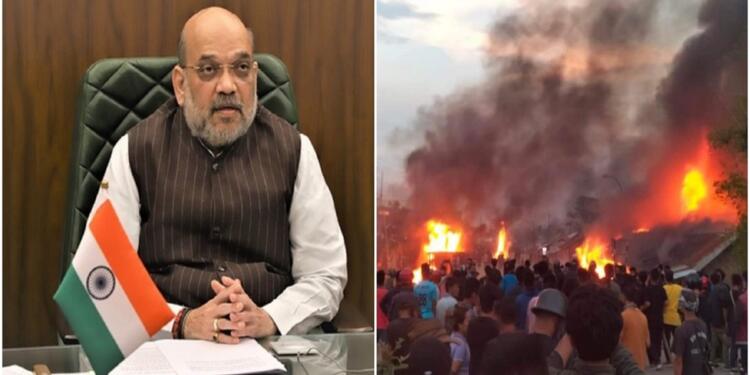On Monday, June 17th, Union Home Minister Amit Shah held a meeting in Manipur to review the security situation. The meeting took place in the North Block of Rayisina Hills and was attended by Chief of Army Staff General Manoj Pandey, Home Secretary Ajay Kumar Bhalla, and Director of Intelligence Bureau (IB) Tapan Kumar Deka, along with other senior officials.
The Manipur’s Chief Minister Nongthombam Biren Singh was absent in this meeting clearly highlights the failure of the central government. It underscores a serious oversight not including any representative from Manipur, revealing a grave lapse.
When and Why Did the Violence Occur
Ethnic conflict started in Manipur on May 3, 2023, resulting in the deaths of 225 people so far and displacement of over 50,000. The Home Ministry has approached this issue solely from a law and order perspective, while the problem is far more complex and pervasive.
Inexperience and Failure
When ethnic unrest erupted in Manipur, the then DGP P. Dongel was removed and IPS officer Rajiv Singh from the Tripura cadre, with no prior experience in Manipur, was appointed. Similarly, retired IPS officer Kuldeep Singh from the West Bengal cadre was appointed as Security Advisor, also with no experience in Manipur. These appointments exacerbated the situation.
Root of the Problem
The current issue in Manipur is not just about law and order but a deep and complex problem involving multiple stakeholders, including some located in foreign countries, engaging in high-stakes games. Therefore, the appointments of Kuldeep Singh and his protege Rajiv Singh worsened the situation.
Need for Permanent Solution
A permanent solution to Manipur’s problem is only possible through deep involvement of all stakeholders. This includes participation from all ethnic groups of the state, elected representatives, political parties, and civil society organizations. Despite directives from Union Home Minister Shah, security forces are facing a credibility crisis.
Lack of Community Trust
The erosion of trust between Manipuri security forces and the Meitei and Kuki communities has deepened significantly over the last 13 months. Meiteis allege partiality from Assam Rifles, CAPFs, and the army towards Kukis, fueling perceptions of bias and unfair treatment. Conversely, Kukis perceive Manipuri police as siding with Meiteis, exacerbating tensions and complicating efforts to maintain peace. This breakdown in trust underscores the urgent need for transparent and impartial policing practices, as well as inclusive dialogue initiatives to bridge communal divides and restore faith in law enforcement agencies. Addressing these grievances is crucial for fostering lasting stability in Manipur.
Lack of Dialogue
The Home Ministry has failed to convene a dialogue table between Meiteis and Kukis. Despite half-hearted attempts, the country’s political leadership has not endeavored to start a dialogue between these two communities.
Need for Dialogue, Not Just Security Solutions
In addition to security measures, the central government must embrace a holistic strategy that engages Manipur’s diverse stakeholders. Rebuilding trust and fostering dialogue among communities, political parties, NGOs, and civil society groups are essential. This inclusive approach not only addresses immediate security concerns but also lays the foundation for sustainable peace and development in Manipur. By involving key figures and organizations from the state, the government can foster a collaborative environment where all parties feel heard and valued, paving the way for long-term solutions that resonate with the aspirations and needs of Manipur’s people.
Conclusion
Resolving the persistent violence and ethnic strife in Manipur demands more than just security measures. It necessitates a comprehensive approach involving robust engagement and dialogue among all affected parties. The central government must prioritize genuine efforts to foster trust and collaboration among ethnic communities, political representatives, and civil society organizations. A sustainable resolution to Manipur’s intricate challenges lies in addressing root causes, promoting inclusive governance, and establishing lasting frameworks for peace and stability. Only through concerted efforts towards dialogue and holistic solutions can Manipur move towards a future of harmony and progress, free from the specter of violence and division.
ALSO READ: The increasing number of Rohingya Infiltrators in India: Causes and Consequences

























